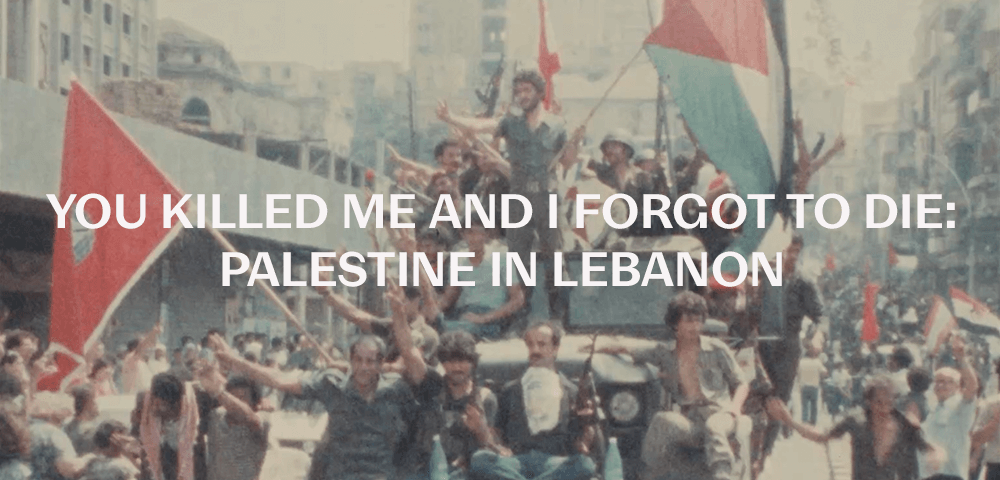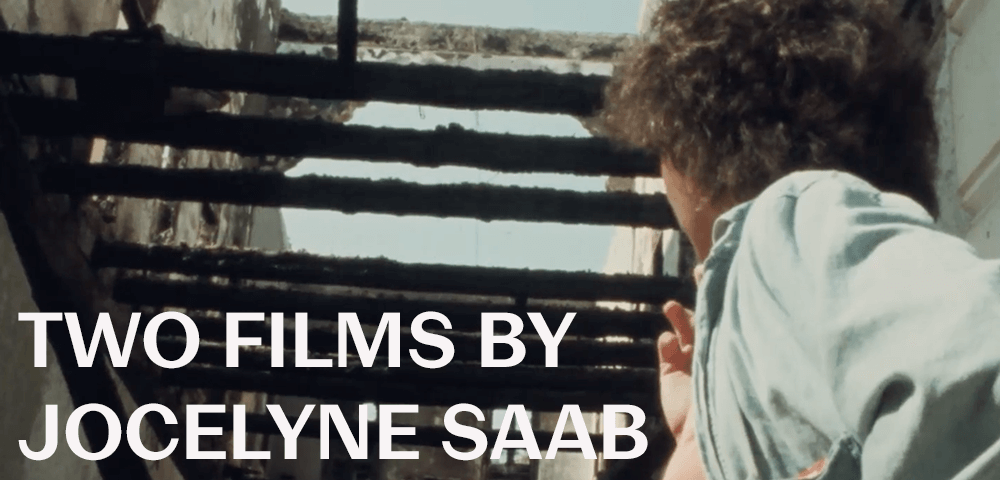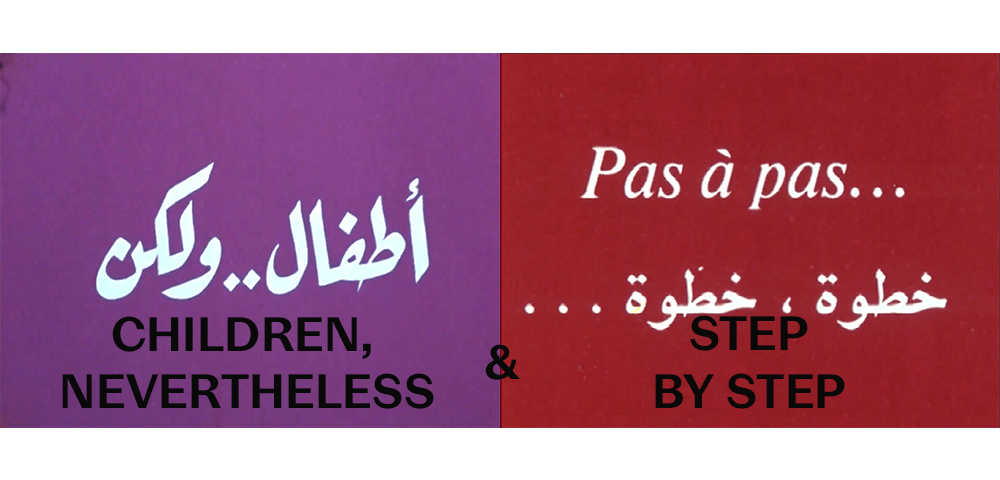
This February, Spectacle continues with our Palestine fundraising series, spotlighting films from across the Arab world with two programs of documentaries made within the context of Palestine-solidarity filmmaking in the tumultuous decades of the 1970s and ‘80s. Each of these films were directed by Arab women, and with the exception of Jocelyne Saab’s BEIRUT, MY CITY, were all made in collaboration with, or with support from, the Palestine Cinema Institute (PCI) in Lebanon and the General Union of Palestinian Women.
Films from Khadijeh Habashneh, founder of the General Union of Palestinian Women, and Jocelyne Saab describe the situation for the women and orphans of Palestine, while films from Lebanon by Jocelyne Saab and Randa Chahal Sabbag document that nation’s sprawling and drawn-out civil war and its intersections with contemporaneous events in Palestine.
All proceeds raised will benefit relief efforts. Special thanks is given to Samirah Alkassim for her assistance in assembling this program.
Content warning: These programs contains explicit images of war and death.
PROGRAM 1: TWO FILMS BY JOCELYNE SAAB
Jocelyne Saab began her career as a documentarian at the outset of the Lebanese Civil War in 1975. She would spend the next decade and a half documenting the many splintering conflicts of the war and its effects across her homeland. Following her experience working as second unit director on Volker Schlöndorff’s Circle of Deceit (1981), Saab began to work in fiction and would only rarely return to documentary, stating in a 1982 interview that, “This documentary phase wasn’t only linked to my personal history; it was determined by my country’s political situation and Lebanon’s cinema history. My trajectory is a bit like that of other Lebanese filmmakers. If I decided to move to fiction it’s because, after speaking in a ‘militant’ manner, I now want the image to speak as much as possible.”
Spectacle is proud to present two of Saab’s early documentaries: the French television-commissioned Palestinian Women (1973) and the second installment of her masterful Beirut Trilogy, Beirut, My City (1983).
PALESTINIAN WOMEN
(LES FEMMES PALESTINIENNES)
Dir. Jocelyne Saab, 1974.
France, State of Palestine. 15 mins.
In Arabic and French with English subtitles.
This early work by Saab finds her interviewing Palestinian women (students and soldiers, mothers and children), giving these often unheard voices a chance to speak to their conditions and experiences of the occupation. This early work by Saab was commissioned by French television, but was never aired and long thought lost. In it, one can see the stirrings of her investigations into the twin themes of liberty and memory that she would follow for the rest of her career.
screening with
BEIRUT, MY CITY
(بيروت مدينتي)
Dir. Jocelyne Saab, 1983.
Lebanon, France. 38 min.
In Arabic and French with English subtitles.
Near the start of the film, Saab and her co-writer, Lebanese playwright Roger Assaf, consider their ambivalence towards their native Beirut before the war; “A supermarket of fishy business and betrayal, that’s what Beirut was.” But the affection for the city evident in Saab’s images – of its architecture and its coastline, to say nothing of its people – betray these feelings. Later, Assaf’s gentle voiceover describes Beirut as a utopia, and because of what Saab has shown us, it is easy to believe him.
These conflicting feelings over a place and its history are what Saab and Assaf pry at in this short but profoundly moving masterwork. Assaf considers the corruptibility of memory, lamenting that, “Man always believes what he sees, and what he sees ends up cheating him.” Saab’s footage is intercut with news coverage of the war – occupying soldiers, bombings, entire families of corpses. Yet Saab’s own scenes of life in Beirut assert the power of the image to correct memory. If memory is produced by bearing witness, Saab entreats us to look with her, and to consider which images we choose to remember.
TICKETS HERE
MONDAY, FEBRUARY 5 – 7:30PM
SATURDAY, FEBRUARY 10 – 5PM
WEDNESDAY, FEBRUARY 21 – 7:30PM
SUNDAY, FEBRUARY 25 – 5PM
PROGRAM 2: CHILDREN, NEVERTHELESS & STEP BY STEP…
Paired together, Khadijeh Habashneh’s Children, Nevertheless and Randa Chahal Sabbag’s Step by Step provide a micro and macro view on neighboring Lebanon and Palestine’s history of solidarity and discord, both motivated by the Arab Nationalist movement.
CHILDREN, NEVERTHELESS
(أطفال …ولكن)
Dir. Khadijeh Habashneh, 1979.
State of Palestine. 22 mins.
In Arabic with English subtitles.
In 1976, the Tel al-Zatar refugee camp came under siege from right-wing militias looking to expel Palestinians from Lebanon. The violence peaked with a massacre in which hundreds of children died and 15,000 residents were forced to flee — half of them children, some of them too small to be able to say their own names. Produced by the PCI and the GUPW, Children Nevertheless (also known as Children Without Childhood) shows the lives of the orphans of those killed in the massacre now living in Bait El-Somoud, a housing facility which was established for them by the GUPW. Habashneh’s film discusses the contradictions between the International Declaration of Child Rights and the reality of the living conditions of Palestinian children suffering in diaspora camps and under the Israeli occupation.
screening with
STEP BY STEP…
(Pas á pas…)
Dir. Randa Chahal Sabbag, 1979.
Lebanon, France. 80 mins.
In Arabic and French with English subtitles.
Shot between February 1976 and March 1978, Step by Step compacts the chaos of the Lebanese civil war into its short run time using archival images, news broadcasts, interviews, and raw documentary footage. Sabbag’s work is sprawling, brutal, and poetic in its approach and clarity even as the span of history it attempts to communicate is long and winding. In the lead up to the civil war, Palestinian refugees spilled in increasing numbers through the Lebanese border and the PLO’s operations within Lebanon alarmed the conservative Phalangist Party. Formed in 1936 by Pierre Gemayel after visiting Germany, the Phalangists were a right-wing Maronite Christian political group that dominated the Lebanese civil war, collaborated with Israel, and fought against pro-Palestinian forces. Sabbag’s film places the Palestinian struggle for liberation in the context of this broader conflict, tracing the dismemberment of Lebanon and the shifting balance of powers in the Middle East as the United States (via Henry Kissinger) manipulated the region during this time.
TICKETS HERE
WEDNESDAY, FEBRUARY 7 – 7:30PM
SUNDAY, FEBRUARY 11 – 5PM
SATURDAY, FEBRUARY 24 – 5PM
MONDAY, FEBRUARY 26 – 7:30PM


